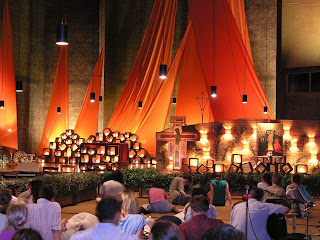A conversation with a wise friend. That's how I would describe the book, "Br. Roger of Taize: Essential Writings" in the Modern Spiritual Masters series from Orbis Press.
This series continues to impress me with its breadth and depth. This particular volume draws from the work of one of the founders and pioneers of the Christian ecumenical movement, Br. Roger of Taize. Many will be familiar with Taize as a pilgrimage site which draws young people from around the world. Or perhaps you have heard the powerful chants prayed at Taize. Taize is also the spiritual powerhouse of the ecumenical movement, challenging Christians to grow deeper in their relationship with Christ, recognizing that in doing so they are also growing closer to one another. The community of Taize has had a profound effect in shaping today's religious culture. Taize is a place of communion, reconciliation, simplicity, and depth. These characteristics clearly come from their founder, Br. Roger.
 |
| Prayer at Taize |
The words in this book are simple. There is no technical theological jargon or complex methods for spiritual growth. The book focuses on the essentials of the spiritual life, but it is not simplistic. There are no "Seven Steps to Spiritual Freedom" or "Spiritual Laws to Live By." Instead, the book goes straight to the heart. It reveals a few simple truths drawn from the Gospel.
"The foundation of our life is to know that God loves us. Everything in our existence springs up from that love."
People who strive to surrender themselves to God body and soul let themselves be built up from within on the basis of a few simple truths from the Gospel. Truths which at one time or another have touched them to the core. Why not summarize them briefly so that they can be called to mind at any moment?Br. Roger discovers the essential and shares what he has found. His approach is one of respectful dialogue. His writing is an invitation to childlike trust. The book is made up of short selections from Br. Roger's writings (most less than a page in length). Many of these short selections contain summaries of conversations he has had with pilgrims or Brothers in the community. All of the selections are the fruit of Br. Roger's experience in seeking reconciliation and understanding. In speaking of his life he recalls a moment of clarity where a he committed himself to a simple truth.
The fruit of much thought, matured slowly and worked out over a long period of time, this summary most often takes shape in the midst of life's struggles. Once we have found it, it can carry us forward our whole life long.
This does not mean a great many words, but a few essential Gospel values that are concise and clear enough for us to return to them again and again. If we forget them for a time, we can return to them again the very moment they come to mind.
When I was young, at a time when Europe was torn apart by so many conflicts, I kept on asking myself: Why all these confrontations? Why do so many people, even Christians, condemn one another out of hand? And I wondered: is there, on this earth, a way of reaching complete understanding of others? Then came a day... when I made a decision. I said to myself, if this way does exist, begin with yourself and resolve to understand every person fully. That day, I was certain the vow I had made was for life. It involved nothing less than returning again and again, my whole life long, to this irrevocable decision: seek to understand all, rather than to be understood.His experience guiding young people as they search for God is also clear in the book.
How can we recognize such a call and discover what God wants from us?It is no wonder that young people were drawn to this wise man who gently invited them to trust in their goodness and ultimately in the goodness of God. Anyone serious about the spiritual life would benefit from reading this book and having a conversation with this wise spiritual guide.
God wants us to be a reflection of his presence, bearers of a Gospel hope.
There are people who perceive, however faintly at first, that God's call for them is a vocation for their entire lifetime.
The Holy Spirit has the strength to sustain a yes for our whole life. Has he not placed in us a desire for eternity and the infinite?
In the Spirit, at every age, it is possible to find new vitality and to say to ourselves, "Be steadfast of heart, and keep going forward!" (Sir. 2:2).
And then, by his mysterious presence, the Holy Spirit brings about a change in our hearts, rapidly for some, imperceptible for others. What had been obscure or even disturbing starts to become clear. Until the end of our days, a yes spoken in trust can bring so much clarity.
Although we are called to make the gift of ourselves, we are not really built for such a gift. Christ understands our inner resistances. By overcoming them, we demonstrate our love to him.




